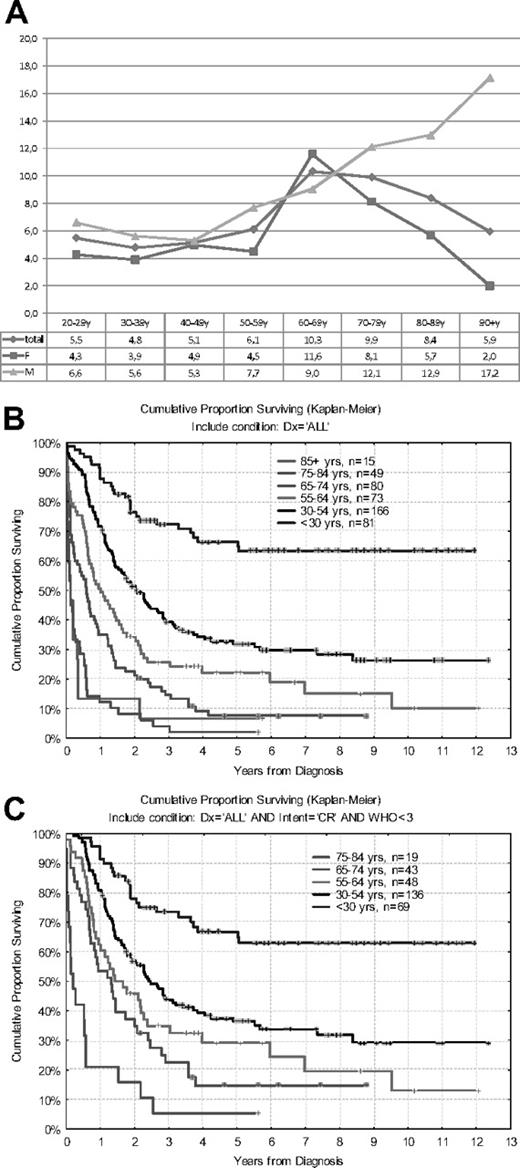To the editor:
We appreciate the acute lymphoblastic leukemia (ALL) study by Moorman et al, based on registration of patients from 1983 through 2001 by collaborating consultants in the Northern England region of the United Kingdom with a 3.1 million population.1 This provides a valuable complement to published experience from selected patients in clinical studies. However, their reported age- and sex-adjusted incidence is incorrect because the total incidences seem to be the sum rather than the median of the sex-specific incidences.
The Swedish Acute Leukemia Registry is a true population-based registry that contains data on 3899 patients diagnosed in 1997 through 2006, which is 98% of those in the compulsory nationwide Swedish Cancer Registry with 50 years of experience; the logistics and validity is previously presented.2 There were 472 adult patients with ALL (median age 54 years) during this 10-year period among 9 million Swedish citizens. We believe that the reported British total incidence is correct, since it is similar to the Swedish, with 5 per million cases per year in ages 20 to 59 years, and an increase to 10 per million in ages 60 to 79 years, with no sex difference. However, at 80 years of age and older, males have a higher and increasing incidence of ALL in contrast to females (Figure 1A) and to older AML patients of both sexes.2 The overall survival according to age, with follow-up of all patients in December 2008 through the population registry, is shown in Figure 1B and supports the strong correlation between age and outcome. If patients are included only if they are fit for intensive treatment, as in clinical studies and in the British report, the outcome looks better, as shown in Figure 1C. The improved outcome for Swedish patients may reflect the later study period. The transplantation rates may also be of importance: 30% of all Swedish ALL patients below 65 years had allogeneic stem cell transplantation (SCT) in first complete remission, and another 10% were transplanted in CR2. As a comparison, 66/225 (29%) had autologous and 35 (16%) allogeneic SCT in the British study. From the updated Swedish Registry on 110 patients diagnosed in the years 2007 through 2009, we can confirm the phenotype distribution with 15% T-ALL and 10% mature B, and also the proportion of Philadelphia chromosome–positive cases, that is, 12% in ages 16-29 years; 27%, 25%, and 25% in subsequent decades, respectively; and 30% in ages 60 and older. Population-based studies on large unselected patient groups with prolonged and complete followup are essential for the interpretation of study data in daily clinical practice, especially for rare disorders such as ALL in adults.
ALL incidence and survival among adults in Sweden. (A) Sex- and age-specific incidence of ALL in adults in Sweden (per million and year). (B) Overall survival from diagnosis of all ALL patients according to age. (C) Overall survival of ALL patients selected for intensive treatment and World Health Organization/Eastern Cooperative Oncology Group performance status 0-II.
ALL incidence and survival among adults in Sweden. (A) Sex- and age-specific incidence of ALL in adults in Sweden (per million and year). (B) Overall survival from diagnosis of all ALL patients according to age. (C) Overall survival of ALL patients selected for intensive treatment and World Health Organization/Eastern Cooperative Oncology Group performance status 0-II.
Authorship
Conflict-of-interest disclosure: The authors declare no competing financial interests.
Correspondence: Prof Gunnar Juliusson, Stem Cell Center, Hematology/Transplantation, BMC B10, Lund University, SE-22184 Lund, Sweden; e-mail: gunnar.juliusson@med.lu.se.


This feature is available to Subscribers Only
Sign In or Create an Account Close Modal